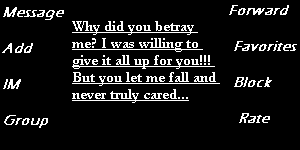Annoying someone via the Internet is now a federal crime.

It's no joke. In 2006, President Bush signed into law a prohibition on posting annoying Web messages or sending annoying e-mail messages without disclosing your true identity. In other words, it's OK to flame someone on a mailing list or in a blog as long as you do it under your real name. Thank Congress for small favors, I guess.
This ridiculous prohibition, which would likely imperil much of Usenet, is buried in the so-called Violence Against Women and Department of Justice Reauthorization Act. Criminal penalties include stiff fines and two years in prison.
"The use of the word 'annoy' is particularly problematic," says Marv Johnson, legislative counsel for the American Civil Liberties Union. "What's annoying to one person may not be annoying to someone else."
Buried deep in the new law is Sec. 113, an innocuously titled bit called "Preventing Cyberstalking." It rewrites existing telephone harassment law to prohibit anyone from using the Internet "without disclosing his identity and with intent to annoy." To grease the rails for this idea, Sen. Arlen Specter, a Pennsylvania Republican, and the section's other sponsors slipped it into an unrelated, must-pass bill to fund the Department of Justice. The plan: to make it politically infeasible for politicians to oppose the measure.
The tactic worked. The bill cleared the House of Representatives by voice vote, and the Senate unanimously approved it Dec. 16, 2005.
There's an interesting side note. An earlier version that the House approved in September had radically different wording. It was reasonable by comparison, and criminalized only using an "interactive computer service" to cause someone "substantial emotional harm."
That kind of prohibition might make sense. But why should merely annoying someone be illegal?
There are perfectly legitimate reasons to set up a Web site or write something incendiary without telling everyone exactly who you are.
Think about it: A woman fired by a manager who demanded sexual favors wants to blog about it without divulging her full name. An aspiring pundit hopes to set up the next Suck.com. A frustrated citizen wants to send e-mail describing corruption in local government without worrying about reprisals.
In each of those three cases, someone's probably going to be annoyed. That's enough to make the action a crime. (The Justice Department won't file charges in every case, of course, but trusting prosecutorial discretion is hardly reassuring.)
Clinton Fein, a San Francisco resident who runs the Annoy.com site, says a feature permitting visitors to send obnoxious and profane postcards through e-mail could be imperiled.
"Who decides what's annoying? That's the ultimate question," Fein said. He added: "If you send an annoying message via the United States Post Office, do you have to reveal your identity?"
Fein once sued to overturn part of the Communications Decency Act that outlawed transmitting indecent material "with intent to annoy." But the courts ruled the law applied only to obscene material, so Annoy.com didn't have to worry.
"I'm certainly not going to close the site down," Fein said on Friday. "I would fight it on First Amendment grounds."
He's right. Our esteemed politicians can't seem to grasp this simple point, but the First Amendment protects our right to write something that annoys someone else.
It even shields our right to do it anonymously. U.S. Supreme Court Justice Clarence Thomas defended this principle magnificently in a 1995 case involving an Ohio woman who was punished for distributing anonymous political pamphlets.
If President Bush truly believed in the principle of limited government (it is in his official bio), he'd have realized that the law he signed cannot be squared with the Constitution he'd sworn to uphold.
And then he'd repeat what President Clinton did a decade ago when he felt compelled to sign a massive telecommunications law. Clinton realized that the section of the law punishing abortion-related material on the Internet was unconstitutional, and he directed the Justice Department not to enforce it.
Bush had the chance to show his respect for what he calls Americans' personal freedoms. Now we'll see if the new president rises to the occasion.

It's illegal to annoy
A 2006 federal law states that when you annoy someone on the Internet, you must disclose your identity. Here's the relevant language.
"Whoever...utilizes any device or software that can be used to originate telecommunications or other types of communications that are transmitted, in whole or in part, by the Internet... without disclosing his identity and with intent to annoy, abuse, threaten, or harass any person...who receives the communications... shall be fined under title 18 or imprisoned not more than two years, or both.
~~~~~~~~~~~~~~~~~~~
We felt this is going to be VERY hard if not impossible to enforce under Constitutional rights. And in the 2 years since it was signed - we were proved right.
Also the person who says they are being harassed - would have to legally disclose their relationship to the harasser during any discovery period and why the alleged harasser is doing it. (Most of our exposed cyberpaths? That's the LAST thing they want -- UNLESS they can twist history in their favor; which they can't - unless they are completely delusional)
Another good reason to always surf on a person's name or nickname before getting involved with them and saving ALL chats with them once it goes over the boundaries of simple conversation (i.e. 'love', cybersex or emotional affairs)
Cyberpaths would be out of luck! - Fighter
Technorati Tags: cyberharassment, online,free speech, abuse, federal crime, Justice Department, annoy, threaten










